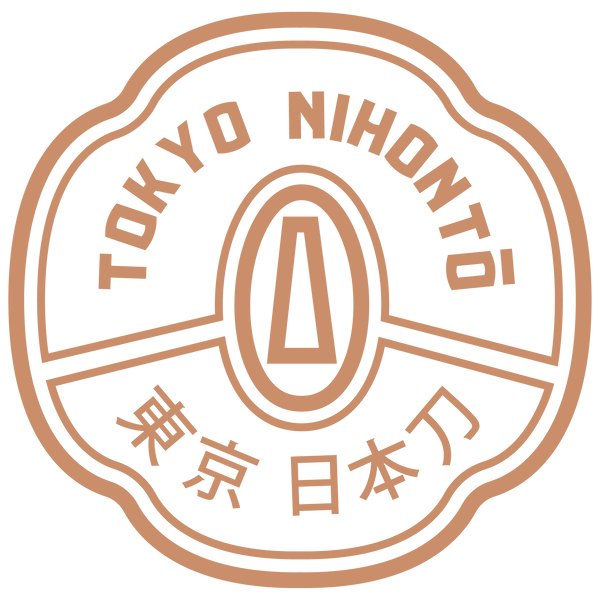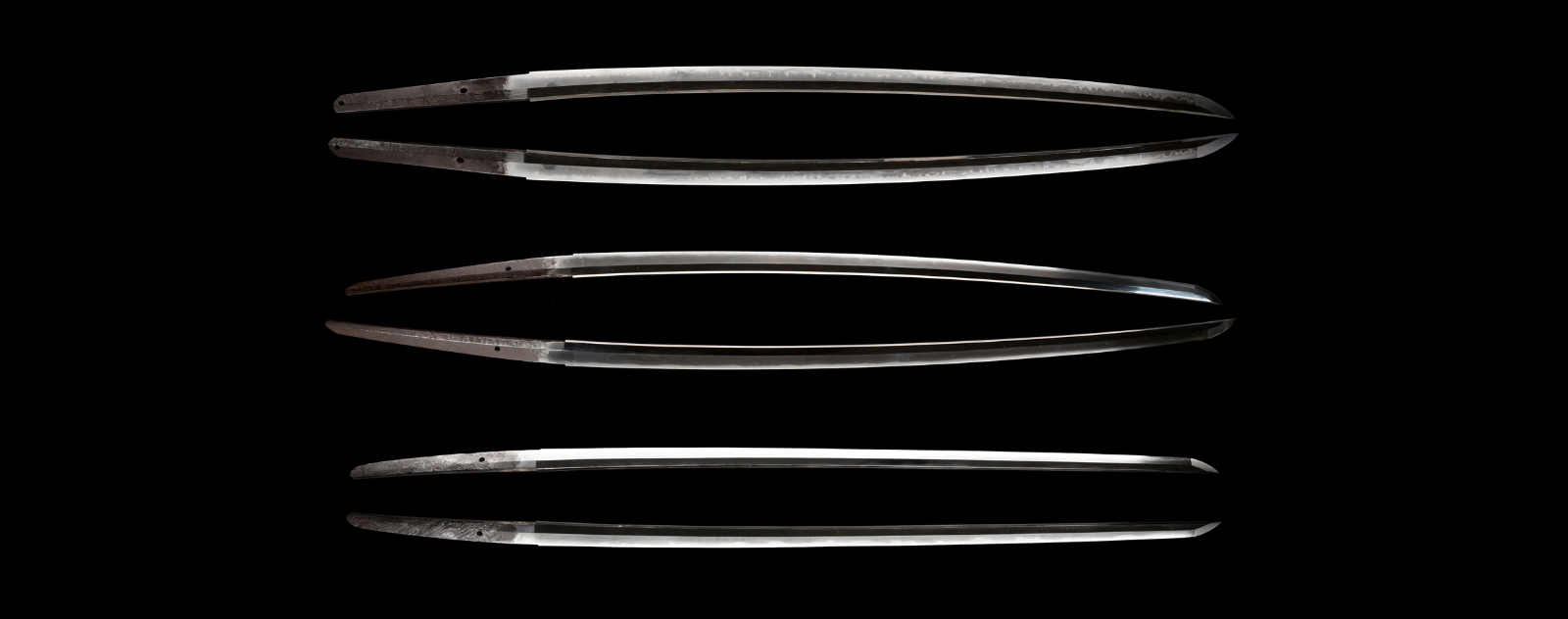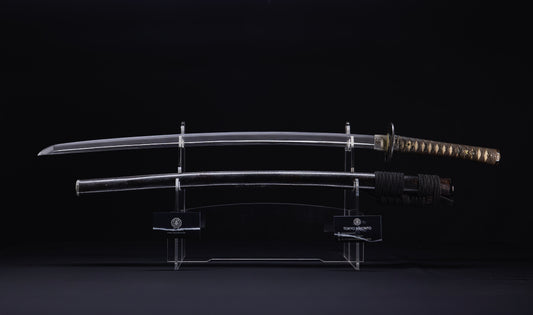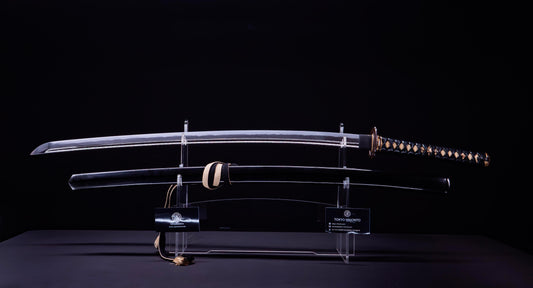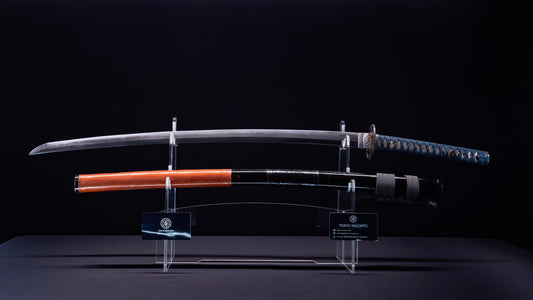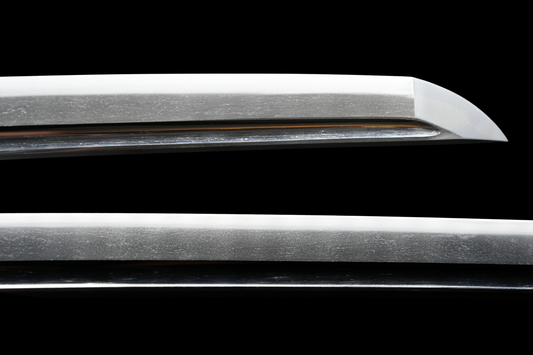Authentic Japanese Sword
NIHONTO IN VENDITA
-
Antique Japanese Katana Sword - Muromachi Uda School, Double NBTHK Hozon
Fornitore:Tokyo NihontoPrezzo di listino $6,200.00 USDPrezzo di listinoPrezzo unitario per -
Antique Japanese Katana Sword, Edo Period with Musha-e Battle Koshirae
Fornitore:Tokyo NihontoPrezzo di listino $3,400.00 USDPrezzo di listinoPrezzo unitario per -
Antique Japanese Katana Sword, Late Edo Shishi Koshirae
Fornitore:Tokyo NihontoPrezzo di listino $3,600.00 USDPrezzo di listinoPrezzo unitario per -
Antique Japanese Katana Sword signed Osafune Sukesada, Late Muromachi - NBTHK Hozon
Fornitore:Tokyo NihontoPrezzo di listino $5,700.00 USDPrezzo di listinoPrezzo unitario per -
Antique Japanese Katana Sword signed Yoshimori
Fornitore:Tokyo NihontoPrezzo di listino $4,400.00 USDPrezzo di listinoPrezzo unitario per -
Antique Japanese Katana Sword with Iron Sukashi & Koshirae
Fornitore:Tokyo NihontoPrezzo di listino $2,600.00 USDPrezzo di listinoPrezzo unitario per
Nel cuore della tradizione, nel vibrante paesaggio urbano di Tokyo , è nata una visione: Tokyo Nihonto . In qualità di conoscitori dell'antica arte dell'artigianato Nihonto, abbiamo deciso di intraprendere un viaggio alla fonte di questa venerata tradizione, per comprenderne e assorbirne l'autenticità e lo spirito.
Abbiamo scavato in profondità nella terra del sol levante, incontrando fabbri appassionati, collezionisti dedicati e potenziali partner. Abbiamo visitato musei con esemplari secolari, ognuno dei quali raccontava la storia di un'epoca in cui il Nihonto era più di una semplice arma, era un simbolo d'onore e l'anima del samurai.
Esplorando la misteriosa bellezza di queste lame , siamo stati ispirati a portare questo artigianato di fama mondiale a un pubblico globale.
Così è stato lanciato Tokyo Nihonto, una squisita miscela di tradizione e modernità, un tributo all'arte del passato e un faro per il futuro dell'artigianato Nihonto. Il nostro viaggio in Giappone è stato più di una spedizione, è stata la pietra angolare di un progetto che incarna lo spirito, la storia e l'arte di Nihonto.
Nacque Tokyo Nihonto, una testimonianza dell'arte della spada.
Authentic Japanese Katana Swords
-
Antique Japanese Katana Sword - Muromachi Uda School, Double NBTHK Hozon
Prezzo di listino $6,200.00 USDPrezzo di listinoPrezzo unitario per -
Antique Japanese Katana Sword, Edo Period with Musha-e Battle Koshirae
Prezzo di listino $3,400.00 USDPrezzo di listinoPrezzo unitario per -
Antique Japanese Katana Sword, Late Edo Shishi Koshirae
Prezzo di listino $3,600.00 USDPrezzo di listinoPrezzo unitario per -
Antique Japanese Katana Sword signed Osafune Sukesada, Late Muromachi - NBTHK Hozon
Prezzo di listino $5,700.00 USDPrezzo di listinoPrezzo unitario per
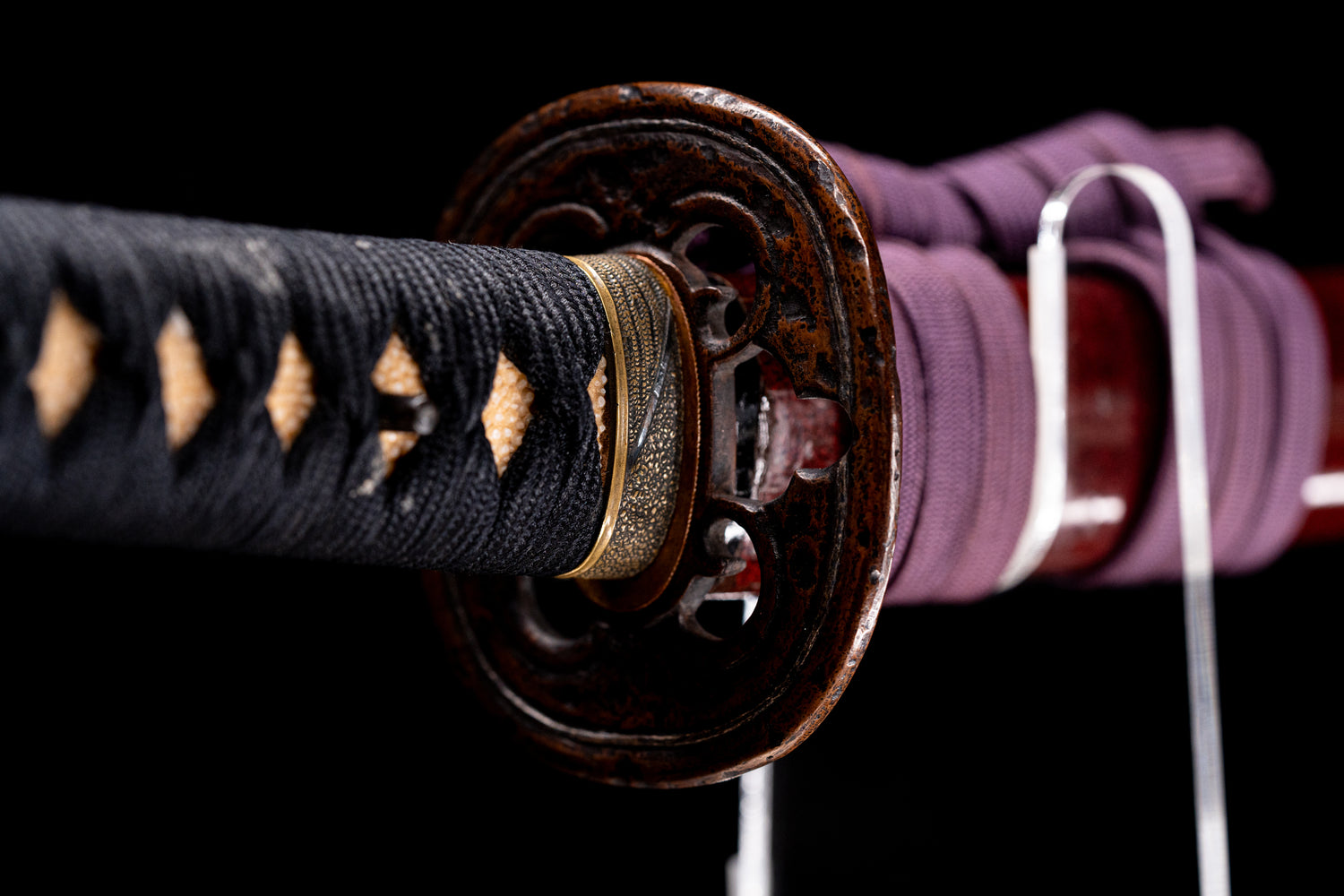
The most famous japanese sword
Authentic Japanese Sword Katana
Discover the elegance and tradition of authentic Japanese Katanas at Tokyo Nihonto. These iconic symbols of Japan’s heritage represent timeless artistry and craftsmanship.
Our collection features Katanas from ancient times to contemporary masterpieces by skilled swordsmiths. Each Katana showcases meticulous craftsmanship and centuries-old techniques. A high-quality Katana is more than an artifact; it is a piece of history. The blade length, typically around 70-73 cm, varies to suit different preferences, with perfect curvature, balance, and sharpness. Traditionally, the Katana is worn with the blade facing upwards, symbolizing readiness and honor.
At Tokyo Nihonto, we provide expert guidance to help you select the perfect Katana. Explore our collection today and bring home a piece of Japanese heritage with an authentic Katana from Tokyo Nihonto.
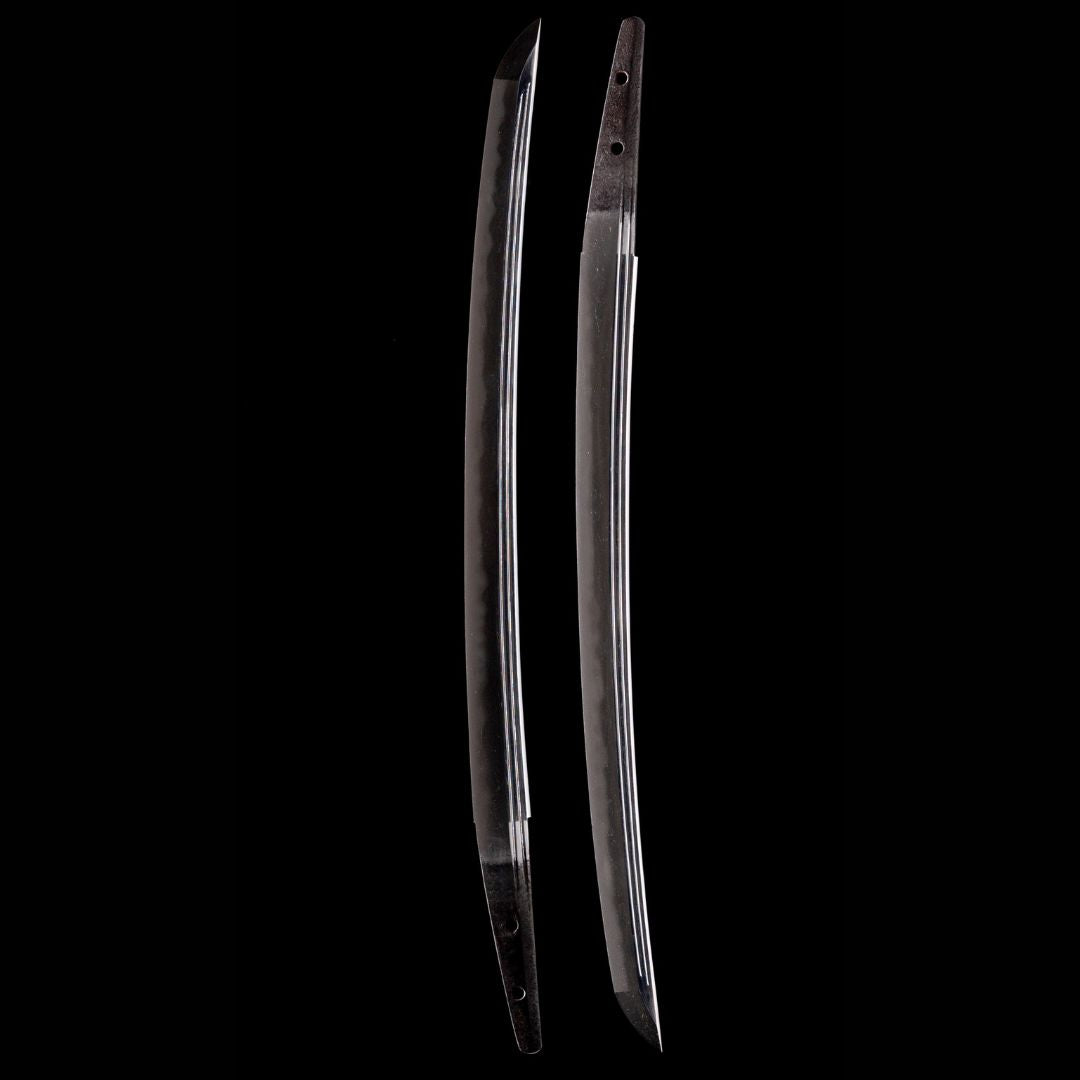
the short japanese sword
Authentic Japanese Sword Wakizashi
Discover the elegance and tradition of authentic Japanese Wakizashi at Tokyo Nihonto. These symbols of Japan’s heritage represent timeless artistry and craftsmanship.
Our collection features Wakizashi, typically 30-60 cm in length, crafted with meticulous skill. Worn on the waist alongside the Katana, the Wakizashi was used for close-quarters combat and self-protection inside castles.
During the Edo period (1603-1868 A.D.), Samurai were required to wear both swords, marking their status. At Tokyo Nihonto, we offer expert guidance to help you select the perfect Wakizashi. Explore our collection today and bring home a piece of Japanese heritage.
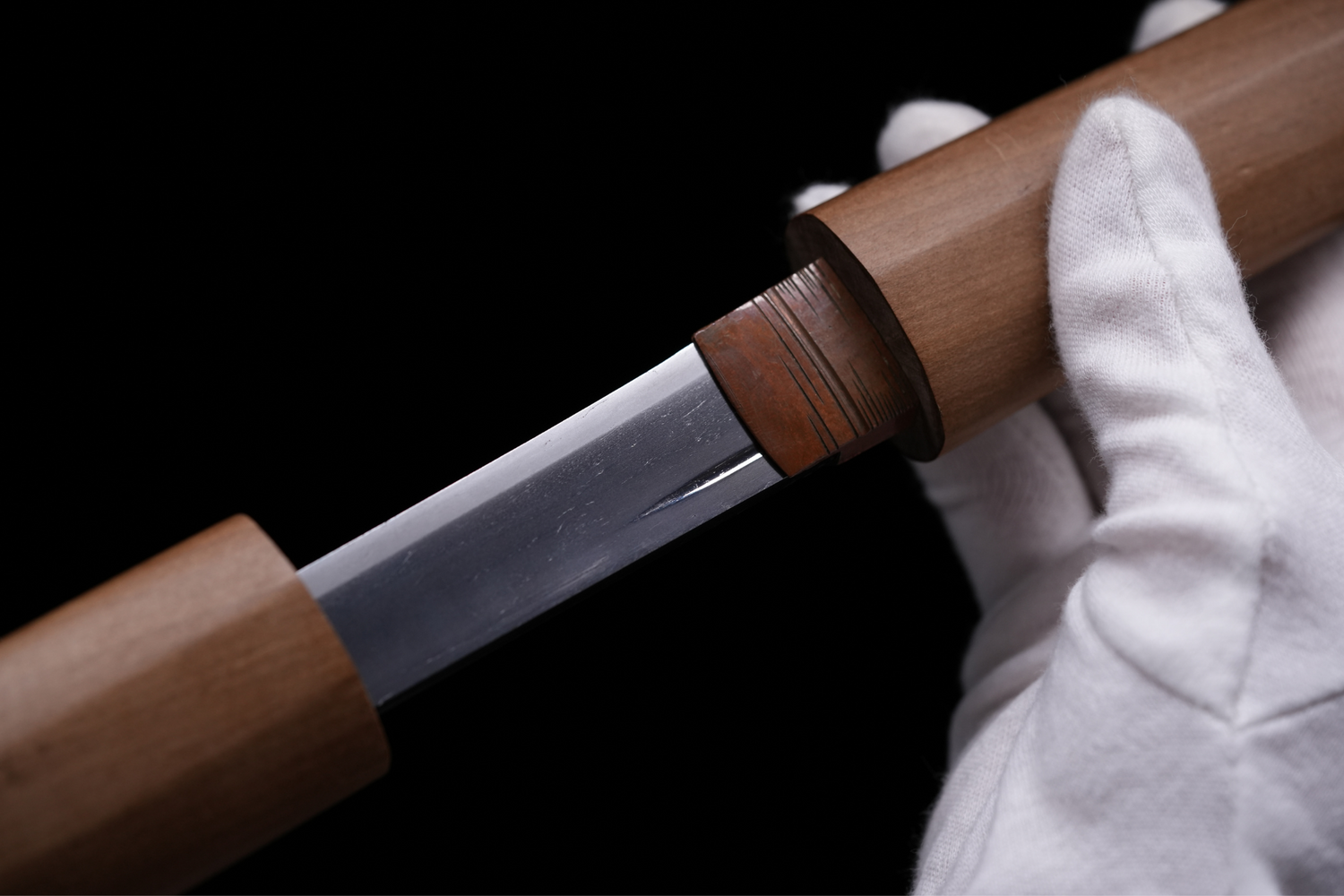
the smallest japanese sword
Authentic Japanese Sword Tanto
Discover the elegance and tradition of authentic Japanese Tanto at Tokyo Nihonto. These compact symbols of Japan’s heritage represent timeless artistry and craftsmanship.
Our collection features Tanto, typically under 30 cm in length, crafted with meticulous skill. Originally used by Samurai on horseback for close combat, the Tanto was aimed at unprotected areas of an enemy’s armor. Depending on how it was carried, it was called Hutokoro-Gatana (Stomach-Sword) or Koshi-Gatana (Waist-Sword).
Tanto are also traditional wedding gifts, believed to protect from evil. At Tokyo Nihonto, we offer expert guidance to help you select the perfect Tanto. Explore our collection today and bring home a piece of Japanese heritage.
About Japanese Sword
How much does a Real Japanese Sword Cost ?
The cost of an authentic Japanese sword can vary widely, depending on several factors. There are various types of traditional Japanese swords, such as the tanto (a short knife), wakizashi (a short sword), and the renowned katana (a long sword). The price range for these swords can start from a few hundred dollars and soar up to more than $50,000 or even higher.
A sword's value is influenced by its quality, the reputation of the swordsmith who crafted it, the presence and authenticity of certificates of provenance, the historical period in which it was made, and other unique attributes. For instance, a sword crafted by a famous swordsmith, accompanied by verifiable certification, and from a notable period in Japanese history will likely command a higher price.
In essence, while there are more affordable options available, a genuine, high-quality Japanese sword can be a significant investment due to its craftsmanship, heritage, and the intricate details associated with its creation.
Can you Buy an Authentic Sword in Japan ?
es, you can purchase an authentic Japanese sword in Japan. The country is renowned for its centuries-old tradition of sword-making, and there are many reputable dealers and craftsmen who offer genuine swords for sale. However, there are important regulations to note:
- Documentation: Every authentic Japanese sword comes with registration papers from the Japanese government, ensuring its authenticity. When purchasing, ensure that these documents are provided, as they certify the sword's legitimacy and historical relevance.
- Exporting: If you plan to take the sword outside of Japan, you'll need to adhere to specific procedures. Also, documentation or undergo an inspection to ensure you're not exporting national treasures.
- Laws & Regulations: Some countries have strict regulations or bans on importing weapons, including swords. Always check your home country's rules about importing swords before making a purchase.
- Reputation: When buying, always choose a reputable dealer or swordsmith to ensure the sword's authenticity. Many renowned craftsmen and shops in Japan specialize in genuine, traditional Japanese swords.
In summary, while you can indeed buy an authentic Japanese sword in Japan, it's crucial to be aware of the regulations in place and to deal with trustworthy sources to guarantee the genuineness of your purchase.
How to know if my Japanese Sword is Real ?
Determining the authenticity of a Japanese sword requires a combination of knowledge, observation, and sometimes, expert opinion. If you're wondering whether your Japanese sword is genuine, consider the following guidelines:
- Certificate: Authentic Japanese swords usually come with certificates that vouch for their legitimacy. Organizations like the NBTHK (Nihon Bijutsu Token Hozon Kyokai) and NTHK (Nihon Token Hozon Kai) are respected entities that issue certificates for genuine Japanese swords. Possession of a certificate from either of these organizations is a strong indicator of the sword's authenticity.
- Craftsmanship: Genuine Japanese swords exhibit meticulous craftsmanship. Examine the blade for fine, consistent grain patterns, known as "hada." The temper line, or "hamon," should be distinct and exquisitely executed.
- Signature: Many authentic swords have the swordsmith's signature, referred to as a "mei," engraved on the tang (the portion of the blade that extends into the handle). Validating this signature can provide insights into the sword's origins and creator.
- Materials: Traditional Japanese swords are fashioned using specialized types of steel, mainly "tamahagane." The blade should have a balanced and substantial feel, not appearing overly light or flimsy.
- Age Indicators: Observable wear patterns, oxidation, and patina can give clues about the sword's age. While age isn't the only determinant of authenticity, genuine older blades often possess specific aging traits that many replicas can't accurately imitate.
- Consult Experts: If you're uncertain, it's best to consult a specialist or expert in Japanese swords. Their expertise and deep knowledge can provide valuable insights, aiding in the confirmation of your sword's authenticity.
- Be Wary of Red Flags: Swords accompanied by exaggerated claims, suspiciously low prices, or devoid of any age indications might be replicas. Also, be cautious of blades that are overly glossy or have etched rather than traditionally crafted hamon.
